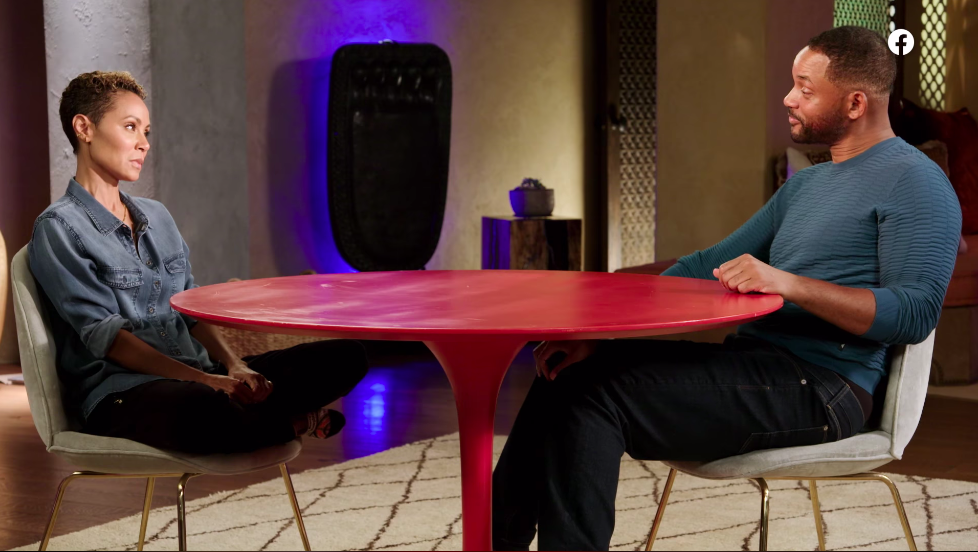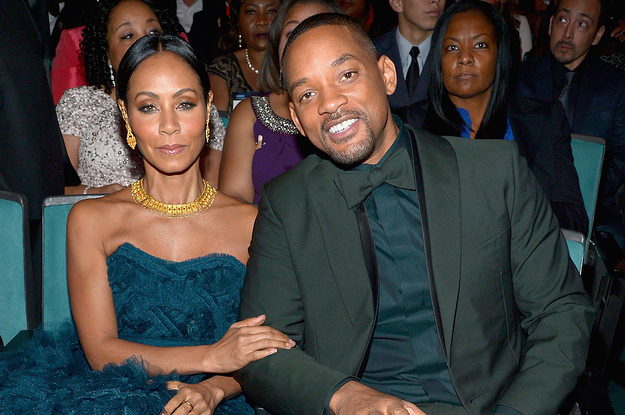Perhaps you’re like me, and you’re waving the white flag. Perhaps you’re on your knees, hands clasped, eyes set toward the sky, begging: Please, Lord, let me not find out any more unsolicited information about Will Smith’s sex life. In the last few months, and especially in the last few weeks, we’ve learned entirely too much.
We’ve learned Will Smith and his wife, Jada Pinkett Smith, have an open marriage, and sometimes it’s hard. Sure. At some point, he wanted a “harem of girlfriends.” Go off! We’ve learned that sometimes Jada is maybe not 100% satisfied with their sex life. Huh? No, wait, actually she is totally satisfied. Folks! In fact, speaking of satisfaction, there was this one time when Smith was so focused on her pleasure that he was either going to satisfy her or die trying. This week, we learned that Smith dealt with being cheated on by his first girlfriend by having so much sex that it made him gag, and at times vomit, as a “psychosomatic reaction” to an orgasm. Driver, stop this bus, I’m done.
But regardless of the mercy you may be begging for, it’s fascinating that we now know this stuff. Not just because of the salacious and utterly bizarre nature of what Smith is revealing about his private life, but because it’s a drastic break in the long-established celebrity relationship we’ve had with Smith. Before we entered this overshare phase, it’s actually hard to think about what we really knew about him. Now, it seems I can’t eject out of the conversation fast enough.
At the peak of his power, a formidable reign that spanned from 1996’s Independence Day to 2008’s Seven Pounds, nearly anything Smith touched turned to gold. He turned 2008’s Hancock into a box office smash for Christ’s sake. He was so good at his job that by 2009, he was voted Hollywood’s most bankable star. He was always unruffled, the Platonic ideal of a celebrity: His face adorned magazines and movie posters, smiling confidently, revealing nothing. He hovered above us, and we projected our hopes and dreams onto him.
But lately, Smith has been coming down to our level. He’s been sharing his wounds, the things that make him human. He’s been sharing his struggles with marriage, fatherhood, and body image. He’s been making vaguely entertaining TikToks. He’s been messy and memeably upset. He’s been confessional like never before.
What’s all this for? The obvious answer is promotion: Smith just released a tell-all memoir titled, simply, Will. Its release coincides with the peak of his press cycle for his latest film, King Richard, where he plays the legendary Richard Williams, father of Venus and Serena Williams. His performance in Richard is the best acting he has done in years; it’s impossible to take your eyes off of him as he disappears into the role. He is a heavy contender for the upcoming Oscar race, and it’s generally a good strategy to keep the Academy voters’ attention on you.
But Smith might have a shrewder plan. A byproduct of ’90s celebrity culture, he is attempting something few men of his generation of stars have done: reinventing himself publicly, to align with the contemporary expectations of celebrity. We once held celebrities at a distance and in high regard. That doesn’t work anymore.
Most of the men who became household names at the turn of the century are content to coast on the old ways of being famous. Not Smith — he is trying to meet the moment, and to do so, he’s on an all-out mission to master the language of modern celebrity. Are you not entertained?

Will Smith’s career highs are historic. Keep this in mind as you consider that his lows have been not just disappointments but, occasionally, catastrophes. Starting in 2013, Smith has been plagued with a series of career failures. That was the year After Earth was released — a film costarring his son Jaden that led one critic to ask, “Is After Earth the worst movie ever made?”
There’s 2016’s Collateral Beauty, which managed to earn a Rotten Tomatoes score only four points higher than After Earth, coming in at a dismal 15%. There’s Focus, a movie you haven’t heard of until you read this sentence. 2017’s Bright, a Netflix film, was widely panned, as was 2019’s Gemini Man.
But the most compelling thing about all these failures is that on paper, all of them actually appear like safe bets. Gemini Man, a big-budget thriller, was directed by acclaimed director Ang Lee. Bright had the backing of Netflix, and it came at a moment when its director, David Ayer, had just proven himself with back-to-back successes with End of Watch and Fury. Even After Earth had M. Night Shyamalan at the helm, and should have theoretically worked.
It’s easy to pin the bad reviews or poor performance of these films on Smith. But choosing each of these films must’ve seemed logical for the actor: He had just spent 10-plus years testing his own star power and passing the test each time. Why wouldn’t these work? Maybe it had nothing to do with him. Maybe Will Smith never changed at all. Maybe we were the ones who changed.
Smith blossomed as a star in the ’90s and early aughts, a stretch of time when the very idea of celebrity was at its most potent. We didn’t know it then, but with relatively few outlets telling us what we should be caring about or consuming, we were in the firm grip of a vast monoculture, perhaps for the last time in pop culture history. Once the Hollywood machine made you a celebrity, there was little you could do to lose the title. Fame was the all-powerful currency. Reality TV was still a quirky and lowbrow offering. You want to watch real people? Instead of the perfect celebrities? What’s wrong with you?
Cut to the decade of Smith’s successive letdowns, and reality TV had supplanted pretty much any other form of entertainment. The Kardashians were putting on a master class in sustaining eyeballs with interpersonal drama played out on TV. Audiences craved messiness and had grown suspicious of the all-put-together celebrities of yore. Online, social media transformed the appearance of authenticity into the measure of who deserves attention. Relatability is the minimum price of admission: We’ve all got phones and cameras, and we can take our attention anywhere, so if we can’t see ourselves in you, why would we give you the time of day, anyway?
It’s tempting to underestimate the significance of the shift in the forms of celebrity. But consider this: In September, Smith told GQ that when he started posting more frequently online, it was in part inspired by seeing Dwayne Johnson and Kevin Hart post behind-the-scenes photos from their movies. Smith seems to have found that shocking: “They were doing unheard of stuff, posting pictures from set,” he told GQ. Unheard of stuff: This was counter to everything Smith had learned in celebrity school — be composed and controlled, and never let the public see your drafts.
The men of Smith’s generation of superstardom seem particularly interested in maintaining how they perform the duties of celebrity. Matt Damon prefers the route of New York Times profiles and late-night talk shows. George Clooney makes himself scarce, and only grants the odd interview. Brad Pitt might be happy to get headlines from touching Jennifer Aniston’s hand, but it’s hard to imagine him posting anything confessional or unpolished. It’s not that these men can’t do it — it’s that any efforts of relatability on their parts simply do not cohere with how we think about them. They’re frozen in time circa 2002, all larger than life and no hair out of place.
What might inspire Smith to try to evolve past this, though? How about his wife, Jada? In 2018, she reinvented herself by launching Red Table Talk, a talk show she hosts with their daughter, Willow, and her own mother, Adrienne Banfield-Norris.
Jada, who is now perhaps more famous than she’s ever been, seems to particularly understand the assignment: the whole premise of her show is built around radical frankness and a willingness to be vulnerable in public. She invites famous people to redeem themselves through honesty, and she shares her private life too. The more open she became, the more the public responded. Perhaps Smith was forced to confront the value of this honesty when Jada used her platform to dissect their marital problems, and as she did, she found an audience willing to engage. “I’m bringing myself to the Red Table,” she tweeted. The internet talked about their conversation far more than they’d talked about any of Smith’s movies in years. It seems like this is what people want now.

You want confessional? Fine, Smith will give you confessional. “What you have come to understand as ‘Will Smith,’ the alien-annihilating MC, the bigger-than-life movie star, is largely a construction,” Smith writes in his memoir. “A carefully crafted and honed character — designed to protect myself. To hide myself from the world.”
The revelation is necessary. We know the jig is up. If Smith is to make the passage from the unreachable mode of celebrity to the relatable realm, he must first admit that the persona was a fiction, and that it served a purpose. There are not many celebrities who make that journey — and even fewer who do so from the level of Smith’s fame.

One of them is Jay Z, who might be the closest analog to the kind of transformation of identity that Smith is trying to achieve. Both have long been seen as the consummate professionals: Smith the reliable big hero actor, Jay the rapper’s rapper. Both have always been put-together, private, calculated. And, crucially, both do not seem to be undergoing this transformation comfortably.
After Beyoncé implied heavily in her 2016 album Lemonade that Jay cheated on her, the rapper released 4:44, the most confessional album of his career. It’s a compelling record that saw Jay facing his failings — as a husband, a father, a man, and an artist. He questions where he got his ideas of masculinity, and wrestles with undoing them. It’s raw and vulnerable and nothing like what we were used to from Jay. It was also his most critically lauded album in a decade.

Both Smith and Jay have presented new, unvarnished sides of themselves as a consequence of the partners’ fame. Neither of them seem to be in their element — Jay begins 4:44 with “Kill Jay Z,” a song that spells out how he’s going to have to get comfortable with ego death, while Will Smith’s TikToks are occasionally kind of cringey or forced.
But on the face of it, it’s hard to deny that the oversharing is working. Here is Smith re-creating a TikTok trend (that uses a Jaden song!). There he goes, talking about this one time he played a prank on Jada by showing one of her sex scenes to his grandmother. It’s not the way he came up, and it’s not the way he was used to performing fame. But surely he can see by now that the more he shares, the more of the world’s attention he has.








